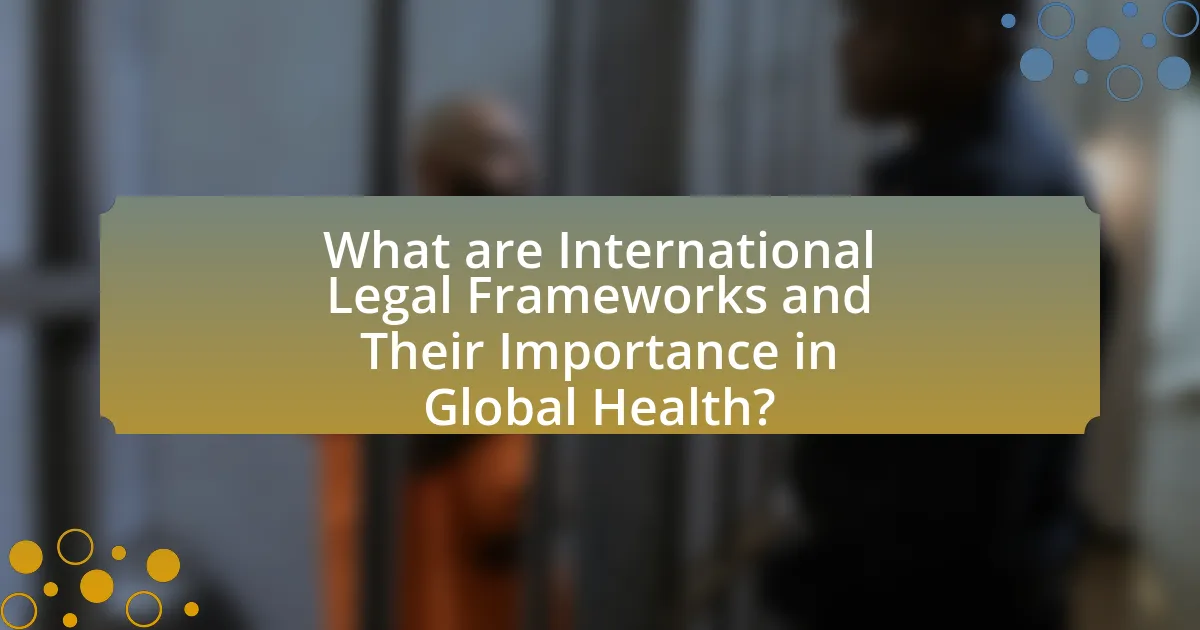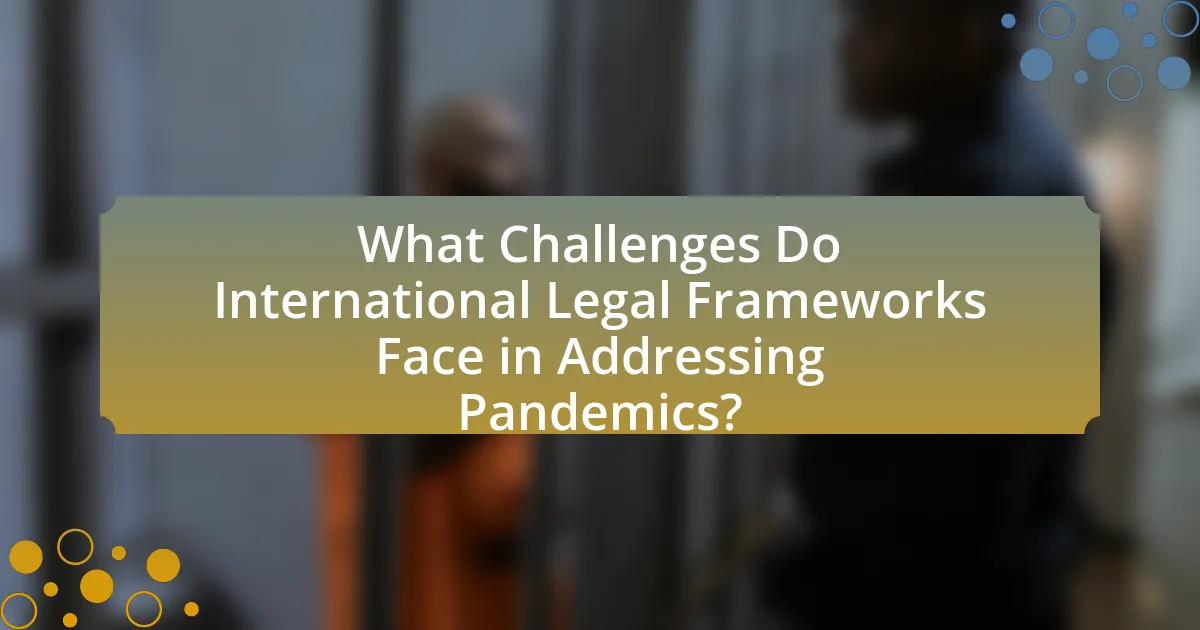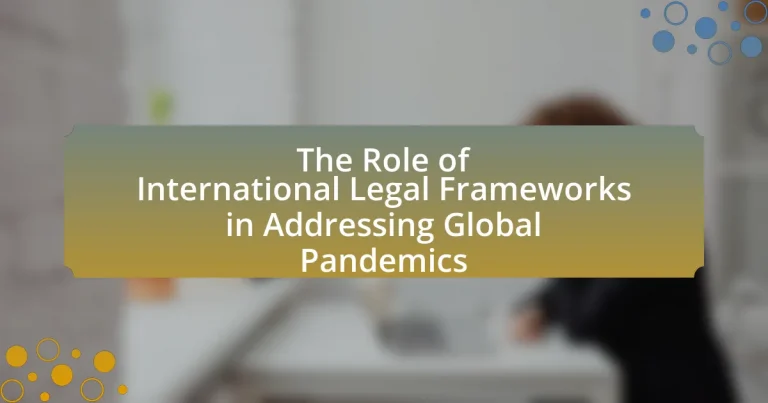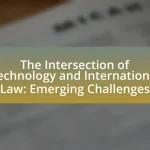International legal frameworks are essential agreements and treaties that govern global health issues, facilitating coordinated responses to health threats such as pandemics. This article examines the significance of frameworks like the International Health Regulations (IHR) and the Framework Convention on Tobacco Control (FCTC) in enhancing pandemic preparedness, promoting international cooperation, and protecting public health rights. It also addresses the challenges these frameworks face, including enforcement issues and resource disparities among nations, while highlighting best practices and recommendations for strengthening legal responses to future health crises. The discussion emphasizes the need for adaptable legal structures that can effectively respond to emerging health threats and ensure equitable access to healthcare resources.

What are International Legal Frameworks and Their Importance in Global Health?
International legal frameworks are agreements and treaties established between countries to govern global health issues, ensuring coordinated responses to health threats. These frameworks, such as the International Health Regulations (IHR) and the Framework Convention on Tobacco Control (FCTC), are crucial for setting standards, facilitating information sharing, and promoting collaboration among nations during health emergencies. For instance, the IHR, adopted by World Health Organization member states, mandates countries to report outbreaks and public health emergencies, thereby enhancing global preparedness and response capabilities. Such legal structures are essential for mitigating the impact of pandemics, as they provide a basis for collective action and accountability among nations.
How do international legal frameworks influence pandemic preparedness?
International legal frameworks significantly influence pandemic preparedness by establishing guidelines and obligations for countries to follow in response to health emergencies. These frameworks, such as the International Health Regulations (IHR) established by the World Health Organization, require nations to develop and maintain core public health capacities, report disease outbreaks, and collaborate on global health security. For instance, the IHR mandates that countries must notify the WHO of any event that may constitute a public health emergency of international concern, thereby facilitating timely responses and resource allocation. This legal obligation enhances global coordination and ensures that countries are better equipped to manage pandemics effectively.
What key treaties and agreements exist for pandemic response?
Key treaties and agreements for pandemic response include the International Health Regulations (IHR) established by the World Health Organization (WHO) in 2005, which provides a framework for countries to report and respond to public health emergencies. Another significant agreement is the Pandemic Influenza Preparedness Framework, adopted by WHO in 2011, which aims to improve global preparedness for influenza pandemics through equitable access to vaccines and antiviral medicines. Additionally, the Global Health Security Agenda (GHSA), launched in 2014, is a partnership of countries and organizations focused on enhancing global health security and preventing infectious disease threats. These frameworks collectively enhance international cooperation and coordination in addressing pandemics.
How do these frameworks facilitate international cooperation?
International legal frameworks facilitate international cooperation by establishing standardized protocols and guidelines for countries to follow during global pandemics. These frameworks, such as the International Health Regulations (IHR), promote transparency and information sharing among nations, enabling timely responses to health threats. For instance, the IHR requires countries to report disease outbreaks and public health emergencies, fostering collaboration and coordinated efforts to contain the spread of infectious diseases. Additionally, these frameworks often include mechanisms for resource sharing, such as vaccines and medical supplies, which enhance collective action and support among nations facing similar health challenges.
Why is a legal framework essential during a pandemic?
A legal framework is essential during a pandemic because it establishes the rules and guidelines necessary for effective public health responses and the protection of individual rights. This framework enables governments to implement measures such as quarantine, travel restrictions, and vaccination mandates while ensuring compliance with human rights standards. For instance, the International Health Regulations (IHR) provide a legally binding framework for countries to report and respond to public health emergencies, facilitating coordinated global action. The existence of such legal structures helps to mitigate the spread of disease, protect public health, and maintain order during crises.
What roles do international organizations play in enforcing these frameworks?
International organizations play a crucial role in enforcing legal frameworks related to global pandemics by establishing guidelines, facilitating cooperation among nations, and monitoring compliance. For instance, the World Health Organization (WHO) sets international health regulations that member states are expected to follow, thereby promoting a coordinated response to health emergencies. Additionally, organizations like the United Nations (UN) provide platforms for dialogue and resource sharing, which are essential for implementing these frameworks effectively. The enforcement of these frameworks is further supported by mechanisms such as reporting requirements and peer reviews, which help ensure accountability among nations in their pandemic response efforts.
How do legal frameworks protect public health rights?
Legal frameworks protect public health rights by establishing regulations and standards that ensure access to healthcare, promote disease prevention, and safeguard the health of populations. These frameworks, such as the International Health Regulations (IHR) and various human rights treaties, obligate states to take necessary measures to prevent health threats and provide essential health services. For instance, the IHR requires countries to report and respond to public health emergencies, thereby enhancing global health security and protecting individual rights to health. Additionally, legal frameworks often include provisions for equitable access to vaccines and treatments, which are crucial during pandemics, ensuring that vulnerable populations receive necessary care.

What Challenges Do International Legal Frameworks Face in Addressing Pandemics?
International legal frameworks face significant challenges in addressing pandemics, primarily due to issues of enforcement, coordination, and compliance among nations. Enforcement is problematic because international law often lacks binding authority, leading to inconsistent implementation of health regulations. Coordination challenges arise from the need for collaboration among diverse countries with varying health systems and priorities, which can hinder timely responses. Compliance issues stem from differing national interests and capacities, as countries may prioritize their own economic and political stability over global health obligations. For instance, the World Health Organization’s International Health Regulations require member states to report disease outbreaks, but compliance is often voluntary and inconsistent, as seen during the COVID-19 pandemic when some countries delayed reporting cases.
How do differing national laws impact global pandemic response?
Differing national laws significantly impact global pandemic response by creating inconsistencies in health regulations, data sharing, and resource allocation. For instance, countries with stringent public health laws may implement rapid lockdowns and enforce mask mandates, while others with more lenient regulations may delay such measures, leading to varied infection rates and healthcare burdens. The World Health Organization’s International Health Regulations (IHR) aim to standardize responses, yet compliance varies; during the COVID-19 pandemic, countries like New Zealand effectively utilized their legal frameworks to enforce strict border controls, while others struggled with legal limitations on public health interventions. This disparity in national laws can hinder coordinated global efforts, as seen in the uneven distribution of vaccines, where countries with robust legal frameworks secured more doses compared to those with weaker systems.
What are the implications of non-compliance with international agreements?
Non-compliance with international agreements can lead to significant diplomatic, economic, and social repercussions. Countries that fail to adhere to such agreements may face sanctions, loss of credibility, and strained international relations, as evidenced by the sanctions imposed on nations like Iran for non-compliance with nuclear agreements. Additionally, non-compliance can hinder global cooperation in addressing issues like pandemics, as seen during the COVID-19 crisis when countries that did not follow World Health Organization guidelines contributed to the spread of the virus. This lack of adherence can result in increased health risks, economic instability, and a breakdown of trust among nations, ultimately undermining collective efforts to manage global health threats effectively.
How can legal frameworks adapt to emerging health threats?
Legal frameworks can adapt to emerging health threats by incorporating flexible provisions that allow for rapid response and modification in public health emergencies. This adaptability can be achieved through the establishment of emergency powers that enable governments to implement necessary health measures, such as quarantine and travel restrictions, while ensuring compliance with international human rights standards. For instance, the International Health Regulations (IHR) provide a legal basis for countries to report and respond to public health risks, emphasizing the need for timely information sharing and collaboration among nations. Additionally, legal frameworks can be strengthened by integrating scientific evidence and expert recommendations into policy-making processes, ensuring that responses are informed by the latest research and best practices in public health.
What are the limitations of current international legal frameworks?
Current international legal frameworks face significant limitations in effectively addressing global pandemics. These frameworks often lack enforceability, as many rely on voluntary compliance from states, leading to inconsistent implementation of health measures. For instance, the World Health Organization’s International Health Regulations (IHR) are binding only to member states, yet enforcement mechanisms are weak, resulting in countries prioritizing national interests over collective health responses. Additionally, existing frameworks do not adequately address the rapid evolution of pathogens and the need for timely data sharing, which is crucial for pandemic preparedness and response. The COVID-19 pandemic highlighted these gaps, as countries struggled with coordination and information exchange, ultimately hindering global efforts to contain the virus.
How do resource disparities among countries affect legal enforcement?
Resource disparities among countries significantly hinder effective legal enforcement. Wealthier nations typically possess more robust legal systems, better-trained personnel, and advanced technology, enabling them to enforce laws effectively. In contrast, countries with limited resources often struggle with inadequate infrastructure, insufficient funding for law enforcement agencies, and a lack of trained legal professionals, which leads to inconsistent application of laws and reduced accountability. For example, according to the World Bank, countries with lower income levels face challenges in implementing legal frameworks, resulting in higher rates of corruption and lower public trust in legal institutions. This disparity ultimately affects global cooperation in addressing issues like pandemics, as countries with weaker enforcement capabilities may fail to comply with international legal obligations, undermining collective efforts to manage public health crises.
What gaps exist in the current legal structures for pandemic response?
Current legal structures for pandemic response exhibit significant gaps, particularly in coordination, enforcement, and resource allocation. For instance, the World Health Organization’s International Health Regulations lack binding enforcement mechanisms, which limits compliance among member states during health emergencies. Additionally, there is insufficient legal clarity regarding the responsibilities of countries in sharing data and resources, as highlighted by the COVID-19 pandemic, where delays in information sharing hindered timely responses. Furthermore, existing frameworks do not adequately address the equitable distribution of vaccines and medical supplies, leading to disparities in access, as evidenced by the unequal vaccine rollout across different nations. These gaps underscore the need for a more robust and cohesive international legal framework to effectively manage global pandemics.

How Can International Legal Frameworks Be Strengthened for Future Pandemics?
International legal frameworks can be strengthened for future pandemics by enhancing global cooperation, establishing binding agreements, and improving data sharing protocols. Strengthening these frameworks involves creating legally enforceable treaties that mandate countries to adhere to specific health standards and response measures during pandemics. For instance, the World Health Organization’s International Health Regulations (IHR) can be revised to include stricter compliance mechanisms and penalties for non-compliance, ensuring that nations prioritize public health over political interests. Additionally, fostering collaboration among nations through joint research initiatives and transparent communication channels can facilitate timely sharing of critical health data, as evidenced by the rapid dissemination of information during the COVID-19 pandemic. This approach not only promotes accountability but also builds trust among nations, which is essential for effective pandemic response.
What best practices can be implemented to enhance legal frameworks?
To enhance legal frameworks, best practices include establishing clear guidelines for international cooperation, ensuring transparency in data sharing, and promoting public health law integration. Clear guidelines facilitate coordinated responses among nations during pandemics, as seen in the World Health Organization’s International Health Regulations, which provide a framework for countries to report health emergencies. Transparency in data sharing, exemplified by the Global Health Security Agenda, fosters trust and enables timely responses to emerging threats. Additionally, integrating public health laws into existing legal frameworks ensures that health measures are enforceable and effective, as demonstrated by countries that adapted their legal systems to address COVID-19 challenges.
How can stakeholder engagement improve legal responses to pandemics?
Stakeholder engagement can improve legal responses to pandemics by ensuring that diverse perspectives and expertise inform policy-making. Engaging stakeholders, such as public health officials, legal experts, community leaders, and affected populations, facilitates the identification of practical legal measures that are culturally and contextually relevant. For instance, the World Health Organization emphasizes the importance of multi-sectoral collaboration in its International Health Regulations, which advocate for the involvement of various stakeholders to enhance preparedness and response strategies. This collaborative approach leads to more effective legal frameworks that can adapt to the complexities of pandemics, ultimately resulting in better health outcomes and compliance among communities.
What role does technology play in strengthening legal frameworks?
Technology plays a crucial role in strengthening legal frameworks by enhancing data collection, analysis, and dissemination processes. For instance, digital platforms facilitate real-time sharing of information among countries, which is essential for timely responses to global pandemics. The World Health Organization’s Global Health Observatory utilizes technology to gather and analyze health data, enabling countries to make informed decisions based on accurate statistics. Furthermore, technology supports the development of legal tools such as electronic contracts and blockchain, which increase transparency and accountability in legal processes. These advancements contribute to more robust legal frameworks that can effectively address the complexities of international health crises.
What lessons have been learned from recent pandemics regarding legal frameworks?
Recent pandemics have highlighted the necessity for adaptable and robust legal frameworks to effectively manage public health crises. The COVID-19 pandemic demonstrated that existing international legal instruments, such as the International Health Regulations (IHR), require updates to address rapid global transmission and the need for coordinated responses. For instance, the World Health Organization (WHO) reported that countries with clear legal mandates for emergency preparedness were more effective in implementing timely public health measures. Additionally, the pandemic underscored the importance of integrating human rights considerations into legal responses, as seen in various countries where restrictive measures led to legal challenges. These lessons emphasize the need for comprehensive legal frameworks that balance public health needs with individual rights, ensuring that responses are both effective and equitable.
How can past experiences shape future legal responses?
Past experiences significantly shape future legal responses by informing policymakers about effective strategies and potential pitfalls in crisis management. Historical instances, such as the global response to the H1N1 pandemic in 2009, highlighted the importance of international cooperation and timely information sharing, leading to the establishment of frameworks like the International Health Regulations (IHR). These regulations were revised to enhance global preparedness and response mechanisms, demonstrating that lessons learned from past pandemics directly influence the development of legal structures aimed at mitigating future health crises.
What recommendations have emerged from global health experts?
Global health experts recommend strengthening international cooperation and legal frameworks to effectively address pandemics. They emphasize the need for countries to enhance data sharing, improve surveillance systems, and ensure equitable access to vaccines and treatments. For instance, the World Health Organization’s International Health Regulations advocate for member states to report disease outbreaks promptly and collaborate on public health responses. Additionally, experts suggest establishing a global pandemic treaty to create binding commitments for preparedness and response, as highlighted in discussions during the World Health Assembly.
What practical steps can countries take to align with international legal frameworks?
Countries can align with international legal frameworks by adopting and implementing relevant treaties and agreements, such as the International Health Regulations (IHR). This involves enacting domestic legislation that reflects the obligations set forth in these international instruments, ensuring compliance with reporting requirements and health measures. For instance, the World Health Organization (WHO) emphasizes the importance of member states developing national health policies that are consistent with the IHR, which includes establishing surveillance systems and response protocols for public health emergencies. Additionally, countries should engage in regular training and capacity-building initiatives to enhance their ability to respond to pandemics, as outlined in the Global Health Security Agenda. By doing so, nations can effectively contribute to a coordinated global response to health threats, thereby reinforcing their commitment to international legal standards.


